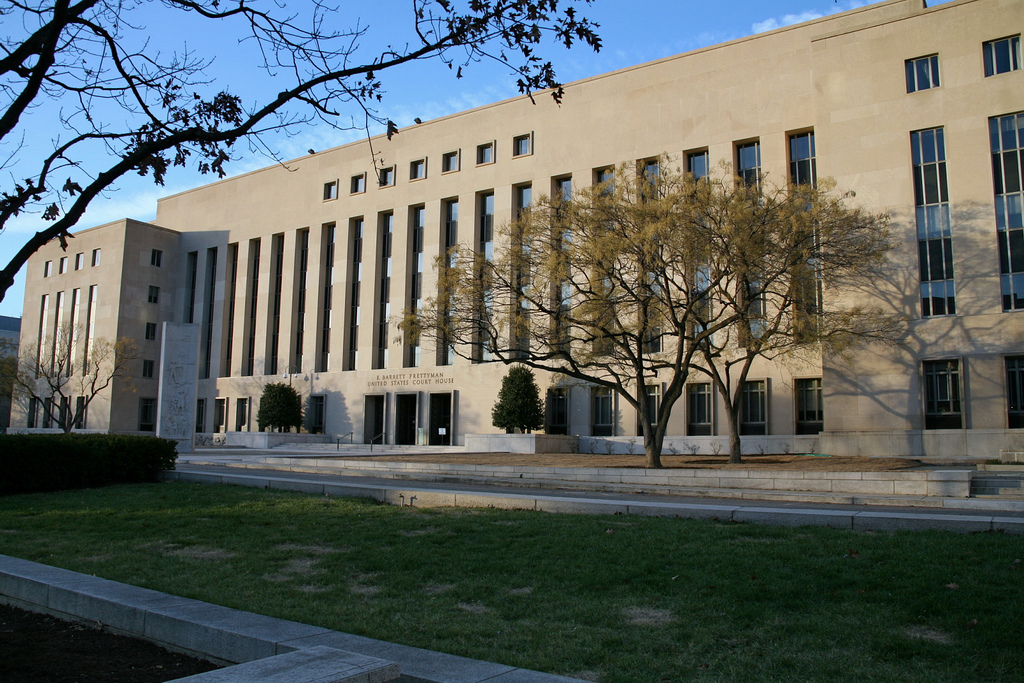A Preview of Oral Argument in Al-Alwi v. Trump
On Tuesday, March 20, a three-judge panel of the D.C. Circuit will hear oral argument in Al-Alwi v. Trump, the case of Guantanamo detainee Moath Hamza Ahmed al-Alwi. Chief Judge Merrick Garland and Judges Karen Henderson and Thomas Griffith will review D.C. District Court Judge Richard Leon’s February 2017 dismissal of al-Alwi’s second habeas petition.

On Tuesday, March 20, a three-judge panel of the D.C. Circuit will hear oral argument in Al-Alwi v. Trump, the case of Guantanamo detainee Moath Hamza Ahmed al-Alwi. Chief Judge Merrick Garland and Judges Karen Henderson and Thomas Griffith will review D.C. District Court Judge Richard Leon’s February 2017 dismissal of al-Alwi’s second habeas petition.
I wrote in October about Judge Leon’s decision and al-Alwi’s appeal, and Russell Spivak followed up with the government’s response and input from amici curiae. (Earlier Lawfare coverage here, here, and here.) Shortly after Russell’s post, al-Alwi filed his reply brief to the government’s response, closing out the briefing to the D.C. Circuit.
Factual Background
As Russell wrote:
Moath Hamza Ahmed al-Alwi is a Yemeni citizen who was captured in Pakistan in late 2001 and delivered into U.S. military custody. According to his petition, on Jan. 16, 2002, al-Alwi “was rendered to Guantánamo Bay, Cuba, where he remains. . . . No charges have been or are contemplated to be filed against him.” As the Justice Department’s brief states, the D.C. Circuit found Al-Alwi to have “received military-style training and weapons from the Taliban, served on multiple Afghan fronts in a Taliban combat unit commanded by a high-level Al Qaeda leader, and remained with his unit after September 11, 2001.” Al-Alwi’s status as a combatant is periodically reviewed—as are all combatant’s statuses, pursuant to President Barack Obama’s 2011 Executive Order 13567—to ensure he remains detained lawfully. Al-Alwi’s latest determination was in 2016; according to the government’s brief, “the United States determined that his continued detention remains necessary to protect against a significant threat to U.S. national security, for ‘his continued and recent extremist statements’ (among other indicia) show that he would be ‘susceptib[le] to recruitment’ by enemy forces if released.”
Procedural History
As I previously summarized:
Al-Alwi previously filed a habeas petition in 2005, which Judge [Richard] Leon took up following the 2008 Supreme Court decision in Boumediene v. Bush, allowing Guantánamo detainees to challenge the legality of their detention. After an evidentiary hearing, Judge Leon denied the petition, finding that the government had established by a preponderance of the evidence that al-Alwi was properly classified as an enemy combatant because he was “part of or supporting Taliban or al Qaeda forces both prior to and after the initiation of U.S. hostilities” in Afghanistan. The D.C. Circuit affirmed in 2011, and the Supreme Court denied cert.
Al-Alwi filed a second habeas petition, the one currently at issue, in May 2015, challenging his continuing detention on the grounds that the original conflict in Afghanistan covered by the AUMF has ceased, and along with it the authority of the United States to detain him. He also argues, in the alternative, that the length of his detention cannot be reconciled with traditional law of war principles, as read into the AUMF by the Supreme Court in Hamdi v. Rumsfeld and reinforced by Congress in the National Defense Authorization Act of 2012. The government filed a motion to dismiss in October 2015, and then the case stalled for a year. Mr. al-Alwi filed a petition for mandamus with the D.C. Circuit in late 2016 to compel action on his habeas petition, prompting the District Court to schedule and hold a hearing on December 20, 2016.
On Feb. 21, 2017, Judge Leon denied al-Alwi’s habeas petition, finding that, as Russell summarized:
- “[T]he record establishes that the President and his national security officials believe and have clearly stated that active hostilities remain ongoing in Afghanistan”;
- “With respect to the legislative branch, Congress passed the AUMF in 2001, which gave the President the authority to use ‘necessary and appropriate force’ in Afghanistan, which remains in effect today [and] indicate that Congress believes that active hostilities are ongoing”; and
- “In addition to showing that the political branches are in agreement about the presence of ongoing hostilities, the government has provided overwhelming evidence that active hostilities are in fact ongoing, with thousands of U.S. service members engaged in a combination of support and active counterterrorism operations against the Taliban, al Qaeda, and associated forces.”
Al-Alwi’s appeal asks the D.C. Circuit to consider three issues:
- Whether the statutory authority of the United States to detain al-Alwi has unraveled because the practical circumstance of the conflict in Afghanistan are too unlike those that informed the development of the law of war and, if not, whether continued and potentially lifelong detention violated the Constitution.
- Alternatively, whether the authority of the United States to detain al-Alwi has expired because the conflict in which he was captured more than fifteen years ago has ended.
- Whether the Constitution requires heightened procedural protections to ensure the continued legality of indefinite detention that has exceeded fifteen years and has no end in sight.
Al-Alwi requested initial en banc review, but the court denied the petition in a per curiam order.
The government’s response argues that:
- Ongoing detention of al-Alwi is legal, in accordance with Hamdi, because de jure and de facto hostilities continue to exist.
- Because the practical circumstances supporting wartime detention persist, even after fifteen years, al-Alwi’s detention does not violate his constitutional right to due process.
- Heightened procedural protections were foreclosed both because al-Alwi forfeited the argument by failing to raise the issue before the district court and because D.C. Circuit precedent in Al-Bihani v. Obama and Al-Odah v. United States rejects the need for heightened scrutiny.
An amicus brief, filed by a group of “experts on international law and foreign relations law,” argues that the district court “improperly followed dicta in Al-Bihani v. Obama when it deferred to the ‘Executive’s opinion’ as to whether the Executive continues to have legal detention authority under the 2001 Authorization for the Use of Military Force.” Amici call on the appeals court to hear the case en banc and “remand to the district court to engage in a fact-based assessment of whether the hostilities in which Appellant was first detained in 2001 continue today, over 15 years later.”
Al-Alwi’s Reply
On Nov. 20, al-Alwi filed his reply brief, rebutting the government’s response and reiterating why the alternative modes of relief he seeks are necessary and proper under the circumstances.
Al-Alwi first challenges the government’s position that the Supreme Court’s decision in Hamdi supports continued detention in this case, asserting that:
[a]ccepting the government’s interpretation of Hamdi would be tantamount to holding that no set of practical circumstances differentiating the Afghan conflict from its predecessors would impact the government’s authority to continue to imprison Mr. al-Alwi … For Hamdi to have any meaning, the plurality must have envisioned changes in the conflict’s practical circumstances other than a formal declaration of surrender that can affect the Court’s understanding of detention authority. And if the differences in practical circumstances setting apart this conflict from its predecessors aren’t sufficient to realize the scenario Hamdi anticipated, it is hard to imagine what differences would be sufficient.
Turning to international legal principles, al-Alwi argues that his continued detention is unjustifiable regardless of whether the body of law applied is that governing international armed conflict (IAC) or that governing non-international armed conflict (NIAC). Al-Alwi accuses the government of “selectively appl[ying] IAC principles to what it deems to be a NIAC, claiming authority to hold Mr. al-Alwi until the end of hostilities, like a prisoner of war in an IAC, [while] it simultaneously denies Mr. al-Alwi protections applicable to IAC detainees ... because it says it is holding him in a NIAC.” This strategic inconsistency in the government’s position, according to al-Alwi, “mak[es] his continued imprisonment all the more arbitrary and contrary to U.S. and international law.”
Al-Alwi asks the court to affirmatively decide, “following Boumediene’s test for the Constitution’s extraterritorial reach to non-U.S.-citizens … that the Due Process Clause applies at Guantánamo to limit the duration of Mr. al-Alwi’s detention.” Alternatively, if the court does not wish to reach the constitutional question, al-Alwi argues it could nevertheless order the government to either charge or release al-Alwi based on the notion that at some indefinite point during the last fifteen years the detention crossed the threshold to unlawfulness.
Additionally, al-Alwi contends that the district court erred in deferring completely to the Executive Branch’s factual determination that the conflict justifying detention continues. It is the role of the courts to “determine whether custody is lawful based on evidence of record, not simply on the jailer’s fiat,” and in this case “the district court didn’t fairly consider (or even allow development of) the record” on whether relevant hostilities are ongoing. The district court’s uncritical acceptance of the government’s position, and disregard of contrary evidence marshalled by al-Alwi, was therefore an improper abdication of judicial responsibility which warrants reversal by the D.C. Circuit.
Finally, al-Alwi rebuts the government’s argument that his request for heightened procedural protections is foreclosed either by forfeiture or D.C. Circuit precedent. The forfeiture claim should fail because “the government plainly understood Mr. al-Alwi to be requesting relief in the alternative to release,” and “[h]e is entitled to expand that argument on appeal by explaining that if this Court declines to order him charged or released, it should direct application of heightened procedural protections on remand.” In any event, forfeiture should be disregarded in the present context, where al-Alwi’s indefinite detention without meaningful review amounts to a “plain miscarriage of justice.” Circuit precedent is also not dispositive, given that the court has not “decided whether the cumulative effect of its decisions results in a violation of the meaningful review Boumediene found was mandated by the Constitution.” After “fifteen years [of detention] with no end in sight,” al-Alwi argues, the court is no longer bound to apply the deferential standard of review of executive determination it previously deemed appropriate. Circumstances have changed in legally-significant ways since al-Alwi’s capture, and the courts should recognize that—the government’s protestations notwithstanding.


.jpg?sfvrsn=d5e57b75_7)

